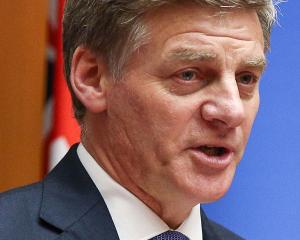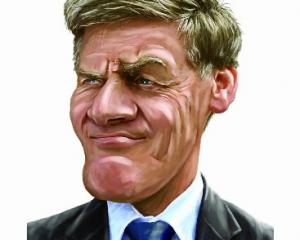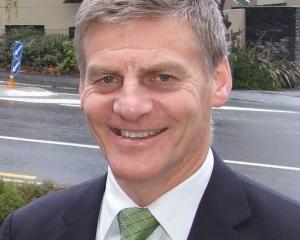John Key made Phil Goff's already difficult job as Opposition leader harder this week.
The agreement between Mr Key's conservative National Party and the left-wing Greens to co-operate on special policy - three areas initially - leaves Labour looking lonely.
Sole Progressive MP Jim Anderton is the only minor party with whom the new prime minister has not done a deal, other than Labour itself.
Mr Key's finessing of MMP politics this week - signing a co-operation agreement with the party it has least in common with is a win for both parties.
It rescues the Greens from perceived irrelevancy for the next three years and gives it influence it might otherwise not have had.
And acquiring the Greens' imprimatur on shared policy gives National more credibility on environmental issues among the sceptics.
Having stopped or stalled many of Labour' sustainability policies, that is useful.
The first achievement will be unveiled in the budget, a home insulation scheme, a variation of which the Greens negotiated with Labour last year.
National had foreshadowed that such a scheme would be part of its fiscal stimulus well before it reached its agreement with the Greens.
It is a super deal: because it is not required, expectations are lower and success is easier to achieve.
Outside of the agreement, stark policy differences between the two parties are no threat, just a pleasant reminder to supporters of both that their leaders have not gone completely bonkers.
Perhaps surprisingly, the deal meets the wishes of many National Party supporters.
The party most favoured by National supporters for post-election deals was the Green Party, according to the party's pre-election polling. About a third of National supporters had a clear preference for it, rating higher than Act, according to Mr Key.
And, importantly for National, it has the potential to undermine Mr Goff's goal of presenting Labour as an alternative government in 2011.
There are recent parallels. Former prime minister Helen Clark's ability to manage three minority governments over three terms with disparate parties of the left, centre and right did much to enhance her reputation as a strong manager and leader. Mr Key watched and learned and is making it look even easier than Miss Clark did.
Mr Key's performance combined with the natural post-election honeymoon effect, has delivered his party a polling boost since the election (it won 44.93%). It is at 57% to Labour's 31% in Sunday's One News Colmar Brunton poll (Labour polled 33.99% at the election). The gap is a little wider according to National's own polling.
Mr Key was preferred prime minister by 51% and Phil Goff by just 6%.
Labour should not be surprised. Helen Clark warned her caucus colleagues for four weeks running at the start of this year to expect Labour's support to drop even further.
If they were still trying to get over the election loss, she was perhaps trying to say that things would get much worse for them before they got better.
In her valedictory speech Miss Clark recalled getting 2% as preferred prime minister before her colleagues (Mr Goff, Michael Cullen, Annette King, Koro Wetere and Jim Sutton) came a-knocking to tell her they could not win with her as leader.
She said "No" and then promoted them.
Unity has been Miss Clark's legacy to the party.
At the election within six months of the failed coup, and actually because of it, the party had recovered to the point that she could have become prime minister, if New Zealand First with the balance of power, had so chosen.
These are the memories that give Labour MPs hope at this time along with the knowledge that their own honeymoon at the start of government came to an abrupt end after six months.
Labour is holding its own in the House, largely owing to the confidence and abilities of Mr Goff and the tactical skills of Trevor Mallard, who appears to be settling into a calmer kaumatua role in Opposition.
Failings of Cabinet Ministers Richard Worth and Nick Smith have been sitting targets for Labour in the absence of major policy conflicts beyond the policies for which National was clearly mandated.
Mr Mallard and Darren Hughes are set to take on a much more important role in the House with the departure of shadow leader of the House Michael Cullen, who will be replaced by Mr Hughes.
Miss Clark's departure from politics this week and Mr Cullen's at the end of April will leave a void in the party.
But the absence of the twin totaras might actually shine a little light on the other trees in the party, or at least make them work a bit harder to get the sun themselves.
The saplings are doing well already: the quality of the 2008 intake is also a source of great hope to the party, with Grant Robertson, Jacinda Ardern, Phil Twyford, Kelvin Davis, Chris Hipkins and Clare Curran singled out for early mention from some of the more experienced hands.
Mr Goff has a clear four years to turn things around for Labour without being seriously bothered about leadership. David Cunliffe is no threat. President Andrew Little might be eventually, but not for at least four years.
Mr Goff will have all the publicity he has dreamed of soon when campaigning begins for the Mt Albert by-election some time in June. A loss would be a devastating blow.
Miss Clark's personal majority last election was large, 10,351. But the swing to National was evident in the party vote and for a byelection that should be the starting point.
Labour's majority on the party vote in Mt Albert was only 2426 votes.
Given the swing to National since the election and the fact that Miss Clark herself will not be campaigning for the yet-unselected Labour candidate, it could be hard to keep. A hugely unpopular decision by Transport Minister Stephen Joyce around the Waterview connection in the next few weeks would help Labour enormously.
How the Greens campaign could also be a big factor. With the Greens having won 3846 of the party vote last time, what Green supporters do with their vote could make all the difference.
And like National, they could make Phil Goff's job a lot more difficult.
- Audrey Young.




